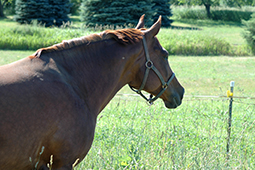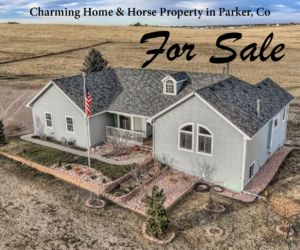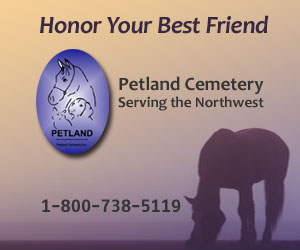Guidelines for Making the Hardest Decision
By Dave Sauter, DVM
 Euthanasia can be one of the more difficult and agonizing decisions we face when it comes to the care of our horses. By its very nature, the subject of euthanasia is emotional, unpleasant and uncomfortable. It is easy and natural to avoid the topic altogether. Nevertheless, exploring the subject will help us understand and prepare in the unfortunate event that we are faced with such a demanding decision.
Euthanasia can be one of the more difficult and agonizing decisions we face when it comes to the care of our horses. By its very nature, the subject of euthanasia is emotional, unpleasant and uncomfortable. It is easy and natural to avoid the topic altogether. Nevertheless, exploring the subject will help us understand and prepare in the unfortunate event that we are faced with such a demanding decision.
The guiding principle when facing such decisions is a desire to do what is best for the animal. Euthanasia is considered if continued existence is no longer attractive but, rather, is worth avoiding. To relieve an animal of insurmountable suffering and the unbearable burden of debilitating disease or injury can be the most responsible and compassionate thing to do.
Although every case is individual and unique, some generalities can be made. Some situations are so sudden and extreme in terms of pain, suffering and hopelessness that it is very clear euthanasia is needed and it might be needed urgently. Without going into gruesome details we probably all can imagine examples. More often, the situation raising the question of euthanasia is not simple and easy to evaluate and come to a decision. In these cases the decision should be based on careful consideration. Circumstances that might lead to the painful decision of euthanasia include such things as:
- Incurable disease such as cancer.
- Transmissible disease – such as the terminal diseases Swamp Fever (Equine Infectious Anemia) or, one with human health concerns, Rabies.
- Progressive disease.
- Chronic debilitating disease.
- Inoperable colic.
- Problems that are overwhelming and draining emotions, resources, and personal finances.
- Hopelessness for improvement.
- Dangerous behavioral traits.
- Hazard to the animal, other animals or to people.
- Avoiding inevitable negative situations anticipated in the near future.
- Avoiding a likely potentially horrible and untimely demise. Avoiding an emergency situation.
- Undue suffering for any reason.
Beyond clinical and objective assessments, other concerns about quality of life can be evaluated. These can be more subtle, elusive and subjective considerations. For example, how are the horse’s energy levels and their ability to get around their environment safely? How is their appetite and body condition? Can they cope with basic daily activities and functions? What is their facial expression like, especially the eyes?
Your veterinarian might be able to help answer some of the questions as well as provide medical information and guidance. However, your veterinarian cannot know your whole story and may not understand all the considerations. We will do our best to help.
If a planned euthanasia is chosen, discuss preparations with your veterinarian ahead of time. Although unpleasant, discussing what to expect, sorting out details such as when and where the procedure will be done, and dealing with the remains have to be discussed. Doing so ahead of time might help reduce some stress later.
Being a responsible owner includes making contingency plans in your absence. With communications technology where it is, hopefully there will be some way for your veterinarian to make a direct connection with you any time of day or night when you are out of town. Please have contact information available ahead of time. If you anticipate that you may not be accessible, think about assigning someone the authority to make life and death decisions concerning your horses in your absence.
In the event that euthanasia is chosen, coping with the loss and your emotions can be challenging. It is important to allow yourself time to grieve your loss. Friends and family can be drawn upon for support. Local and national counseling organizations, such as the University of California Davis, School of Veterinary Medicine’s Pet Loss Support Hotline (530-752-4200) are available. Don’t be afraid to ask for help.
Published September 2011 Issue

The Northwest Horse Source is an independently owned and operated print and online magazine for horse owners and enthusiasts of all breeds and disciplines in the Pacific Northwest. Our contemporary editorial columns are predominantly written by experts in the region, covering the care, training, keeping and enjoyment of horses, with an eye to the specific concerns in our region.





